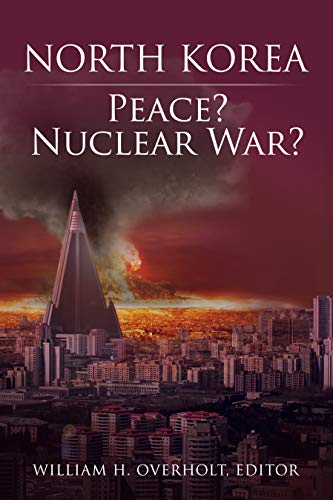North Korea: Peace? Nuclear War?
William Overholt has edited a very important book on that ever obscure subject, North Korea and its nuclear weapons.
Bill and I were colleagues a lifetime ago at Brzezinski’s Research Institute on International Change at Columbia University.
For the past decade, he has been at Harvard University, and is a well regard Pacific specialist.
In this boom, he has brought together a diverse set of analysts from the United States, South Korea and China to analyze the issue.
By putting under one roof, a variety of perspectives, it highlights that not only are the facts disputed but the solutions as well.
As Overholt described the book: “This is a subject and a book for minds that are comfortable with dissonant trends, dissonant goals and dissonant personalities.”1
By itself, this would limit its readership.
But it should be read carefully by those interested in understanding the world of the 21st authoritarian states and how conflict can be contained, or spread dependent upon how the US and its allies grasp how much the world is changing as the end of history is itself over.
A key aspect of the change is highlighted by Overholt in his overview to the book, one which is generally not grasped.
The age of the superpowers is over; the world of co-opetition among the 21st authoritarian powers and the liberal democracies is unfolding.
And in this world, the “allies” of the United States have much greater latitude for their own failures and successes.
Another potentially decisive change is that the Koreans, both north and south, have taken charge of their relationship.
The U.S. and China (not so much Russia and Japan) still have huge influence, but there is a crucial shift of the initiative from foreigners to Koreans.
The emotional momentum of the talks is decisively different when there is a pervasive feeling that the Koreans are gradually taking charge of their own destiny.
At the same time this has been a bit unsettling for Washington, which is accustomed to giving orders and having them obeyed, albeit occasionally with some complaining and minor pushback.2
The book takes seriously the efforts by President Trump to break through with North Korea.
This has not always been assumed by many of the talking heads in the media or the experts whose intellectual lives are built upon the endless realities of a divided Korea and US and Chinese confrontation.
But this is a serious historical turning point, one way or the other.
Clearly negotiations between a flaky U.S. President and a North Korean Chairman who may be jerked around by dangerous domestic developments carries substantial risks.
There is an equal risk that the 2020 U.S. election will lead to repudiation of any agreement by any victorious president other than Donald Trump.
But both the U.S. and North Korea have serious, competent support bases.
Trump’s chief negotiator, Stephen Biegun, is widely respected and he can build on the legacy of Stephen Bosworth, a politically independent figure who served a Democrat President.
The nuclear issue is sufficiently urgent that there is a chance a sensible outcome could lead Washington to rise above stereotypes and partisanship,3

